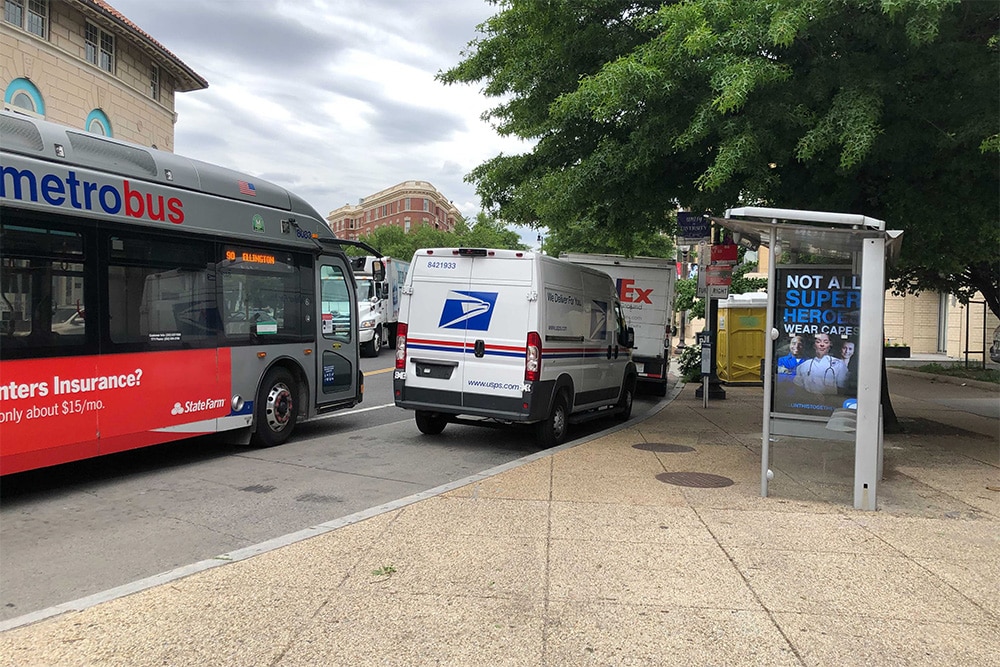Home » Innovation & Technology » Rethinking Urban Mobility
Innovation & Technology
Rethinking Urban Mobility
Leveraging Data and GPS for Curb and Mobility Management
In an era of urbanization and technological advancement, the way we move within cities is undergoing a profound transformation. The way our curbs and streets are used has been changing quickly—from the rise of new modes of transportation such as dockless scooters, to the rapid growth of goods delivery in cities. As a result, rethinking urban mobility has become imperative, and one of the key drivers of this transformation is the innovative utilization of data and GPS from connected vehicles to support curb and mobility management.
Reimagining the Humble Curb
The curb, long thought of as a simple strip of concrete dividing road and sidewalk, is emerging as a critical component in the reimagining of urban mobility. Traditionally associated with parking and drop-off points, the curb is now being redefined to accommodate a wider range of activities, from rideshare pickups and e-commerce deliveries to micro-mobility services like e-scooters and bike-sharing. This newfound complexity, however, requires sophisticated management to avoid chaos and congestion.
Historically, curb management has been reactive rather than proactive. Cities relied on manual, one-time data collection methods and lacked real-time insights into how curbs were being used. This has exacerbated various inefficiencies, such as vehicles circling in search of parking spaces, double-parked delivery trucks in bike lanes, and obstructed pedestrian pathways. Fortunately, the proliferation of connected vehicles, equipped with GPS and data-gathering capabilities, is changing this paradigm.
The Rise of Data-Driven Mobility Management
Connected vehicles are transforming urban mobility by generating a wealth of real-time data. These vehicles are equipped with GPS, sensors, and communication technologies that enable them to continuously transmit information about their location and additional vehicle data. Harnessing this data holds the potential to optimize various aspects of urban mobility, particularly curb management.
Imagine a scenario where a city’s curb management system is fed with data from connected vehicles. These vehicles could automatically pay for their use of curb and street space seamlessly, while providing valuable insights for cities to better manage supply and demand for different use cases. Moreover, cities could dynamically allocate curb space based on real-time demand, converting parking zones into temporary loading zones during peak delivery hours and accommodating the needs of rideshare services precisely where they’re needed.
Precision and Sustainability
The marriage of data and GPS in the realm of urban mobility management extends beyond just efficiency; it’s a critical component of sustainability efforts. Reducing congestion and optimizing curb space can have a positive impact on air quality and overall environmental health. When data guides the allocation of curb space, it reduces the unnecessary movement of vehicles, cutting down emissions and fuel consumption.
Furthermore, by gaining insights into travel patterns and traffic flow, city planners can make informed decisions about infrastructure investments. This could lead to more strategic placement of public transportation routes, incentivizing the use of eco-friendly transportation options, and identifying where to place EV charging infrastructure.
The Road Ahead
Rethinking urban mobility through data and GPS-enabled connected vehicles is a journey that requires collaboration between technology innovators, city planners, policymakers, and citizens. As we move toward a future where cities are smarter, more efficient, and sustainable, the integration of real-time data from connected vehicles into curb and mobility management systems will play a pivotal role.
The era of smart curbs, precision parking, and adaptive mobility solutions is dawning upon us. By embracing the transformative power of data and GPS technologies, cities have the opportunity to alleviate traffic congestion, reduce emissions, and create more livable urban environments. As we reimagine our cities, let us not only focus on the vehicles that transport us but also on the data that guides us toward a more connected, efficient, and sustainable urban future. ◆
-
This author does not have any more posts.


The Digital Tsunami is Here
How Data Standards are Shaping the Future of an Interconnected

The Smart Technology Revolution is Here
The Transformative Era of Urban Mobility






